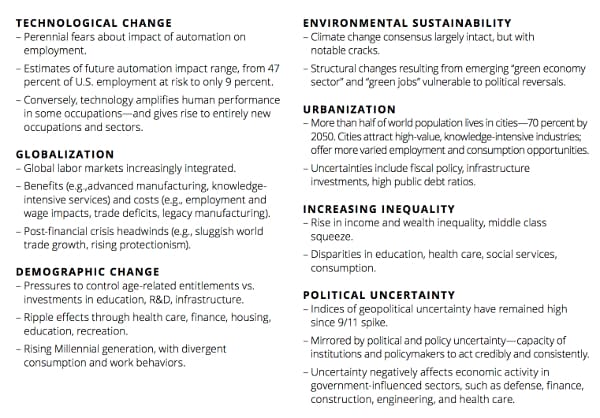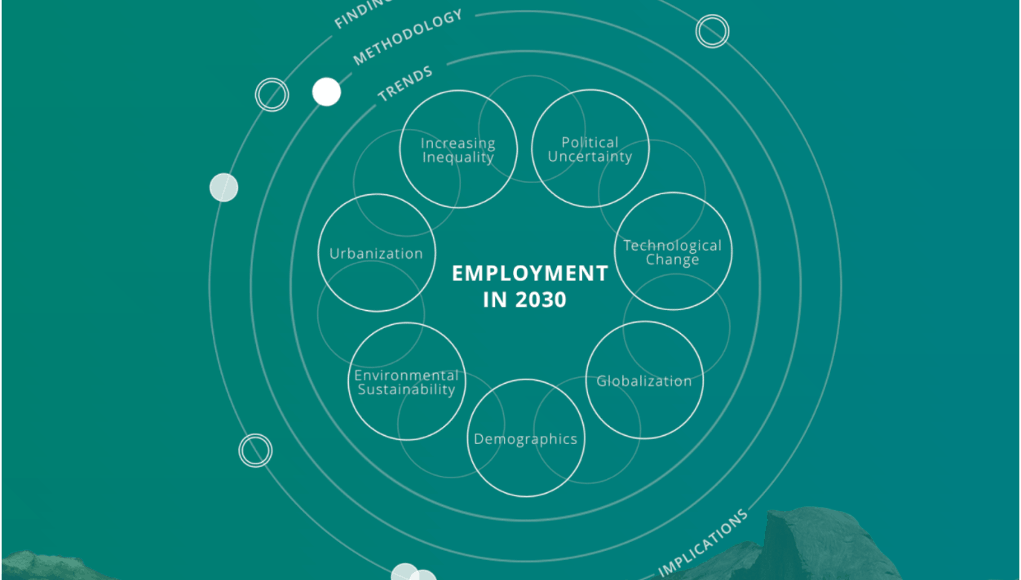The Future of Skills, a new report from Pearson, looks optimistically at the employment landscape in the U.S. and U.K. (be sure to also check out the microsite for this report, which is well-done and a step above earlier reports).
Pearson worked with researchers from Nesta and machine learning expert Michael Osborne of the Oxford Martin School to identify seven megatrends that will all have significant influence over the jobs of the future:

Pearson’s conclusion is that we can all stop agonizing about machines taking our jobs. Our research suggests a less optimistic (or at least more divisive) view of the employment landscape
Methodology & Conclusions
Pearson convened thought leaders to predict how megatrends will affect the future demand for different types of jobs and the skills needed for that work, and surfaced the ways that these trends might interact. For example, an aging society could lead to increased healthcare spending, and it’s possible that technology could deliver productivity advances that would alleviate these spending pressures.
Machine learning was applied to the expert classifications to predict which jobs would be on the rise, which would be in decline and the skills needed. They converted these insights into actionable recommendations for education and training systems—both from a policy and a practice perspective.
Pearson predicts that the future will be about leveraging both human and machine capabilities and share six research conclusions:
- Only one in five workers are in occupations that will shrink. This figure is much lower than recent studies of automation have suggested.
- Only one in ten workers are in occupations that are likely to grow.
- Seven in ten workers are in jobs with where there is greater uncertainty about the future but we can do a great deal to help people prepare for the future.
- 21st-century skills will be in demand, but a more nuanced understanding of which skills will be in greatest demand is required.
- Our research definitively shows that both knowledge and skills will be required for the future economy.
- Occupations and their skill requirements are not set in stone. Occupations can be re-designed to pair unique human skills with the productivity gains from technology to boost demand for jobs.
Pearson also tracked 365 professions and ranked the top 10 likely to be in demand by 2030 in the U.S. and U.K.
 What Skills Will Be In Demand?
What Skills Will Be In Demand?
The top ten skills, abilities and knowledge areas associated with rising occupations confirm the overall importance of social and emotional learning, critical thinking and learning to learn.
 Educators will need to define aspects of social and emotional learning and how to support development, and develop pedagogies and systems to accelerate skill development and retool teacher preparation.
Educators will need to define aspects of social and emotional learning and how to support development, and develop pedagogies and systems to accelerate skill development and retool teacher preparation.
Education systems should plan for dynamic change including adaptive learning pathways marked by badges and credentials
Employers will need to balance investments in technology and human resources to maximize productivity and continue to look beyond traditional degrees to demonstrated competence
Individuals should develop their creativity and originality, fluency with ideas and active lifelong learning.
A More Challenging View
While we are tech optimists, our research suggests that this report understates the coming displacement. That may be because the report looks only 13 years out and because it is challenging to predict how and when augmentation and automation will change and then eliminate jobs by sector and geography.
Here’s some real-time data. This week I viewed a demo of a marketing startup. The co-founder, a data scientist, showed me how his software could analyze, segment and target potential customer groups and automatically launch online marketing campaigns. He said, “While we talk about this publicly as augmenting roles, we just eliminated three jobs—a data manager, a market research analyst and a marketing manager.” He added, “There are 1,000 other startups here in Silicon Valley automating every process possible in every sector.”
It is even harder to predict job creation than job destruction, but it seems clear that there will be net dislocation in most geographies–perhaps not in the next five years, but certainly in the next 15 years.
As much as we’d like to believe that we could learn our way out of this challenge, the combination dislocation and income inequality (out of work and pissed off) and more frequent catastrophes (from the collision of globalization, urbanization, automation and climate change) will strain social systems beyond current capacity, requiring stronger safety nets and some form of a universal basic income (see the Planet Money episode).
The expert tagging missed two key skills that are important today and vital tomorrow. Entrepreneurship ranks high on the list of required skills. With the coming level of change, we’re all entrepreneurs (whether inside or outside organizations). The report also understates the project-based nature of work. Design thinking and project management will be the most important career skills in most fields.
Despite a more dire view of displacement, we also have a more optimistic view of the impact opportunity than presented in the report. The methodology wasn’t designed to review impact opportunities, but they can’t be overlooked in painting the 2030 landscape. Artificial intelligence (AI) will help solve major diseases, make clean energy more plentiful and affordable, ease backbreaking work and create incredible wealth.
But it is clear that income inequality will grow rapidly as returns on labor shift to returns to capital—the makers, owners and financiers of the robots (and other enabling technologies) will win and win big. This inequality and pressing ethical concerns (genome editing, privacy and security) will outstrip civic infrastructure in developing countries and the U.S. and Europe (Scandinavia appear better positioned).
Pearson’s report appears mostly right on implications but understates the challenges to come. What we can all agree on is the need for community conversations and updated graduate profiles. It’s time for smart cities to build learning ecosystems from early learning to job training. It’s time to build civic capacity for waves of tough legal, ethical and moral dilemmas for the paradox to come

You need to be a member of School Leadership 2.0 to add comments!
Join School Leadership 2.0